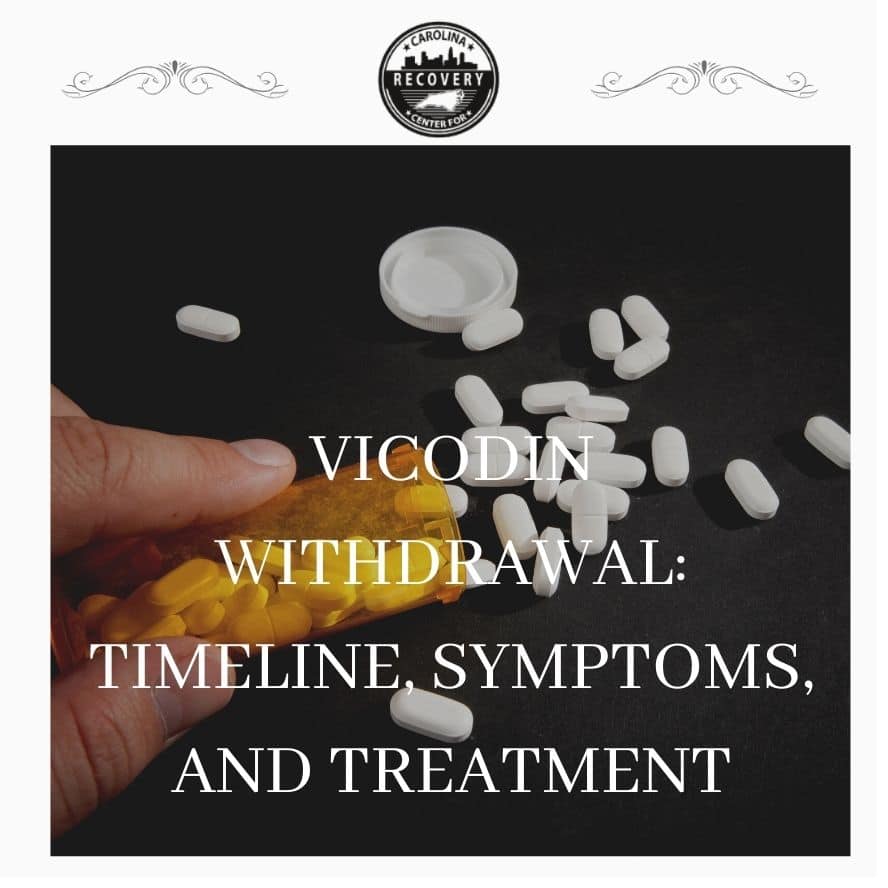Vicodin Withdrawal: Timeline, Symptoms, and Treatment

Medically Verified: 2/1/24
Medical Reviewer
Chief Editor

All of the information on this page has been reviewed and verified by a certified addiction professional.
Vicodin is a prescription opioid medication that contains hydrocodone and acetaminophen. While this medication is effective in treating the symptoms of pain, it is known to possess habit-forming qualities. Because of this, Vicodin is a Schedule II drug, meaning there is a high risk for abuse and addiction.[1]
If an individual abuses Vicodin, they will develop a tolerance to the drug. This means that they will have to continually increase their dosage of the drug to experience the desired result. Unfortunately, tolerance ultimately leads to dependency and addiction. Individuals who are addicted to Vicodin will experience withdrawal symptoms if they decide to stop taking the medication.
Although opioid withdrawal is typically not life-threatening, it can be very uncomfortable. A professional detox and treatment program can help individuals overcome the Vicodin withdrawal timeline with comfort and ease.
The Symptoms of Vicodin Withdrawal
The symptoms of Vicodin withdrawal are similar to other opioid pain medications. While opioid withdrawal is typically not life-threatening, the symptoms can be extremely difficult to manage without professional treatment. Oftentimes, individuals who attempt to detox at home relapse due to their discomfort. Attending a professional medication-assisted detox program is vital to one’s success in recovery.
The symptoms of Vicodin withdrawal typically include:[2]
- Agitation and anxiety
- Muscle aches and pains
- Teary eyes and runny nose
- Profuse sweating
- Chills and goosebumps
- Excessive yawning
- Nausea, vomiting, and diarrhea
- Dilated pupils
- Opioid drug cravings
- Restlessness, insomnia, and exhaustion
The symptoms of withdrawal can be managed with the assistance of a professional medication-assisted detox. Individuals who are addicted to Vicodin should never attempt to detox at home, as some symptoms may lead to adverse health reactions. For example, vomiting and diarrhea can lead to dehydration without proper medical intervention.
How Long Does Vicodin Withdrawal Last?
While the length of Vicodin withdrawal varies from person to person, there is a general timeline that most people experience. The first symptoms of withdrawal typically begin between 6-30 hours after the individual’s last dose and peak by the third day of detox, however, this will depend on the individual’s characteristics.
Vicodin withdrawal usually subsides after one to two weeks. However, some individuals may experience post-acute withdrawal syndrome (PAWS), where their symptoms linger for weeks or months longer than expected.
Individual factors that affect the Vicodin withdrawal timeline include:
- Length of use
- Dosage
- Frequency of use
- Age
- Overall physical health
- Presence of co-occurring disorders
- Polysubstance abuse
The fastest and safest way to recover is to attend a medication-assisted detox program. Professional detox programs provide their patients with FDA-approved medications to soothe severe symptoms of withdrawal. This allows the patient to overcome the physical distress of withdrawal so they can focus on healing the mental and emotional aspects of their addiction.
Treatment for Vicodin Withdrawal
Vicodin detox must be treated under the supervision of medical professionals. Attempting to detox at home often leads to relapse and overdose. This is because individuals who have stopped taking Vicodin will experience their tolerance going down. Then, when they attempt to take the same dosage they consumed during active addiction, their body cannot handle it, and they are at an increased risk for overdose.
The best way to avoid the life-threatening reactions to Vicodin withdrawal is to attend a professional detox program.
Medication-Assisted Detox
Medication-assisted detox combines traditional detox practices with the use of FDA-approved tapering medications. When an individual is attending a medication-assisted opioid detox, they will be given medications to soothe symptoms of withdrawal and prevent drug cravings. This allows the patient to fully focus on the root causes of their addiction, requiring less time to recover from the physical damages of Vicodin abuse.
The main medications used during Vicodin detox are buprenorphine and methadone. These medications are partial opioid agonists, which are medications that partially bind to the opioid receptors in the brain. This tricks the brain into thinking it’s receiving the substance it craves without providing the patient with the high they are chasing.
Non-Drug Therapies
Because the withdrawal symptoms of Vicodin addiction are less severe than other drugs like benzodiazepines or alcohol, patients have the option of utilizing non-drug therapies. Rather than taking medication to soothe symptoms of withdrawal, detox patients might utilize holistic practices.
Examples of non-drug therapies used during detox may include:
- Meditation
- Massage
- Acupuncture
- Mindfulness exercises
- Yoga
These holistic detox practices help individuals learn how to self-soothe during the withdrawal stages of detox. While some individuals may choose to use a holistic approach, others may combine medication-assisted detox with holistic detox. Additionally, professional detox facilities provide their patients with 24/7 support. This means that patients can talk to professional crisis counselors at all times, receive vital healthcare, and much more.
Find a Vicodin Detox Program in North Carolina Today
Vicodin addiction is not an easy condition to beat, especially if you’re attempting to do so on your own. Thankfully, there are plenty of professional detox programs that are available to help you and your family through this tough time.
Carolina Recovery Center uses both medication-assisted treatment and holistic therapies to provide patients with the strongest foundation of sobriety possible. If you or a loved one are ready to begin a new way of life and beat your addiction to Vicodin, contact us today.
References:

